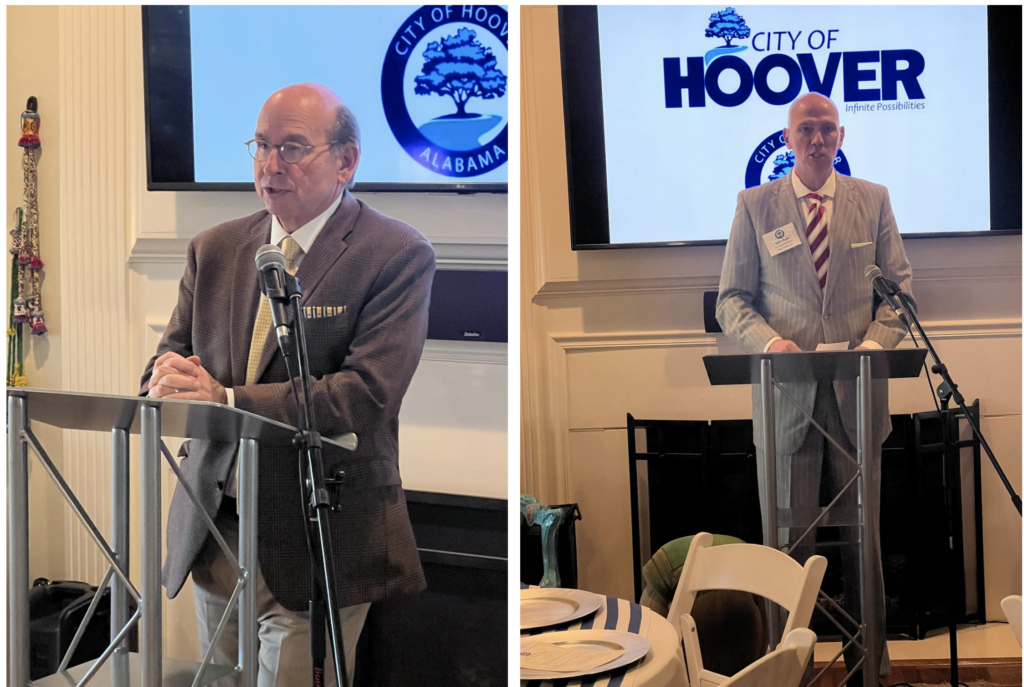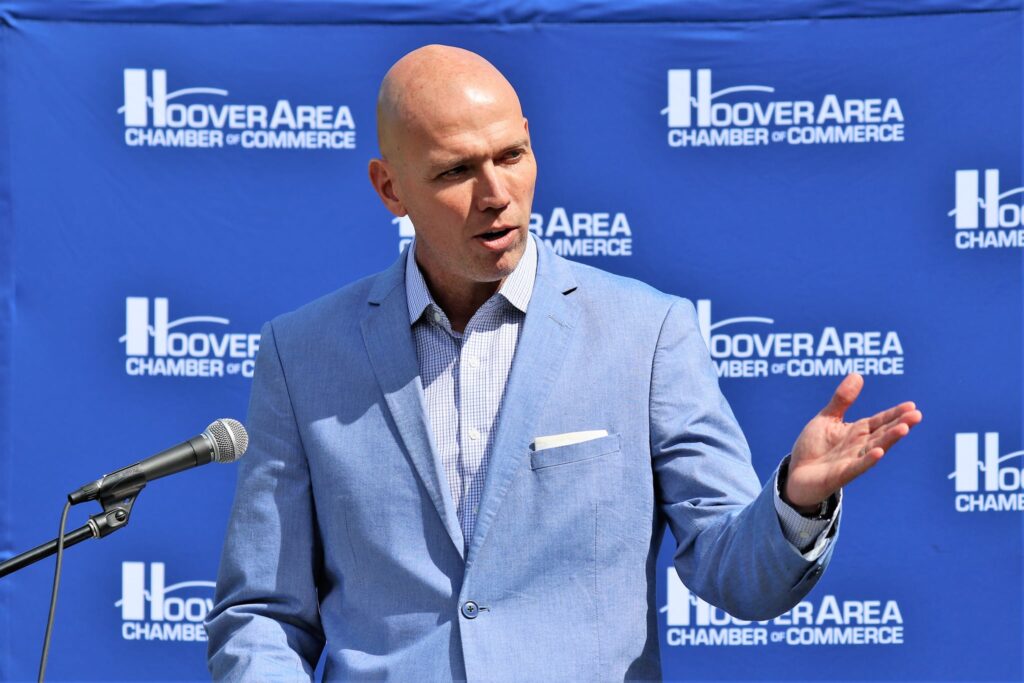Five questions for the City of Hoover following contested Certificate of Need hearings:

It’s been several weeks since the Hoover Healthcare Authority defended its Certificate of Need application for an outpatient surgery center at the proposed Riverwalk development. Citizens were given little to no notice to participate in the contentious hearing, which revealed a great deal of information beyond the proposed facility itself. The hearing included testimony detailing millions in pre-paid rent for a building that is currently unoccupied, behind-the-scenes accusations and counter-accusations of wrongdoing, a previously undisclosed forensic audit, and more. Council President John Lyda testified that he saw it primarily as an economic development rather than a healthcare facility project. City lawyers clarified his answer during later testimony. Council meetings continue to reveal a pattern of secret-keeping by Hoover’s leadership. For instance, the city’s budget has had to be amended twice since the hearings began related to that project, once for legal fees and once because the city needed to increase the budget for expenses with totals unavailable at the time when the lease was signed. Most recently, it was revealed that in an email sent in April, which was exclusively obtained by Alabama Today, City Council President John Lyda described “financial disarray.” Here are the Top 5 questions residents of Hoover should be asking their City Councilor and the Mayor since city leadership is not volunteering answers: Was the Hoover Healthcare Authority legally permitted to apply for the Certificate of Need? Page 60 of City Ordinance 23-2634, passed by the Hoover City Council on November 20, 2023, clearly states that the Developer would obtain the Certificate of Need. However, the Hoover Healthcare Authority (solely funded within the City of Hoover budget) applied for the CON instead. Should taxpayers be responsible for the legal fees and other costs associated with something that records indicate would be the developer’s responsibility? Why did Mayor Frank Bracoto and the City Council hide the need for the ongoing forensic audit? What is the status of the forensic audit revealed during the hearing and the annual audit? How will the forensic audit be paid for, and why didn’t the Council approve the costs before it began? Here’s what John Lyda said on April 9 in his email about the need for an audit: Silence is golden unless the silence is from city officials hiding the truth from their constituents. Alabama Today still awaits answers from the Public Information Office, which hasn’t responded to requests from May 17th and multiple follow-ups. Fortunately, sources reveal that Wendy Dickerson, the City Clerk, has a record of readily providing information when asked, except for when city leadership, including its lawyer, steps in and objects. As of last week, when asked, Dickerson insisted that the request, which was submitted on June 12, continues to be reviewed. Contact information for the Mayor can be found here. You can see their contact information here to reach a city councilor.
Apryl Marie Fogel: Hoover City Council President John Lyda’s Quarterback Fake

Here in Alabama, football is beloved; there’s nothing like an unexpected play in a big game, something like a quarterback fake—a play requiring skill and precision akin to a magician’s sleight of hand. But while deception entertains on the field or stage, it’s troubling in local politics. Hoover has been rocked of late by confounding admissions, accusations, and unanswered questions, dividing the city council and fracturing relationships. Some are unaware of the turmoil at City Hall, while others ponder the way forward. City leaders, led by Mayor Frank Bracoto and Council President John Lyda, have sought to downplay or ignore question upon question and issue upon issue. City Administrator Ken Grimes followed their lead earlier this week and responded to concerns posed by residents on Facebook. Though the story he was responding to provided video evidence of a direct quote by the CFO and statements made in sworn testimony by the mayor, Grimes called it “junk taken out of context.” He didn’t clarify whether it was the mayor’s comments or the CFO’s that he believed was junk or what additional context he thought was needed to understand why a lease was signed before the costs were known or why the mayor said under oath that he hadn’t read it. Observers agree that the unfolding saga is more complex than officials admit, and a resolution is unlikely unless transparency improves. Could these issues be a series of unintentional and unrelated fumbles? Perhaps, but why would those involved leave them lingering and unaddressed for so long? For several years now, Lyda, Brocato, and their supporters have treated nearly every inquiry of questionable behavior as mere distractions rather than cause for concern. Until now, different situations have been treated as one-offs rather than a pattern, but a clear pattern is emerging, and I’m here to lay it all out for you in story form. Why story form? While not exactly boring in these circumstances, the interworkings of city government aren’t particularly riveting either. The facts laid out here are just that: facts. They stem from dozens of interviews, reviewing dozens of media stories, council meeting videos (no thanks to the city), searching for documents buried in dense public meeting packages, and reviewing audio recordings of testimony from the sparsely attended recent hearings. The city itself has been…less than helpful. Buckle up for a true story told in parts to bring the many converging details together for the first time. This is, without a doubt, just the beginning. Chapter 1: Darkness Slowly But Steadily Descends on the Field Once upon a time, Hoover seemed to have a government guided by the conservative values of small government, fiscal responsibility, transparency, and accountability. However, as the city’s population, economy, and infrastructure grew, sunshine faded on the public information accessible to those who live, work, and do business there. I live in neighboring Birmingham and heard the city was overwhelmingly conservative, so imagine my surprise when I learned that while the state was going forward, Hoover was going backward with public information. Around August 2021, city officials sparked controversy by deleting years of council meeting videos from their official YouTube channel without notice or explanation. When confronted, no one would take responsibility for the decision. The city attorney, Phillip Corley, told The Hoover Sun, “This was a council policy communicated by the council president to the city clerk.” The Sun asked follow-up questions about the conflicting information from the City Attorney and evidence of when the videos were discovered missing, and his questions were ignored. The move to limit the availability and coverage of videos prompted the launch of The Hoover Channel, a YouTube page with over 200 videos created by Robin Schultz. He and his teenage grandson, Jackson Schultz, maintain the site. Based on what I witnessed at the last council meeting, Jackson did the technical camera work while Robin sought answers and accountability from the council himself. After the meeting, Jackson hurried his grandfather along to help him pack up the bags of equipment they used. After the council was questioned about the deletions, Lyda informally polled the council members and formalized a new policy. The new one restricted the city’s livestream. It would now end before the public comments section of the meeting, and the city was now not only allowed to delete the videos after 60 days or after minutes had been approved but required to do so. I’ve talked to multiple people about this, and not one person can explain the positive benefit of deleting the videos for the city if there’s no liability related to what has been done or said. Corley, the city attorney, defended the council’s actions. I’m paraphrasing here, but he essentially said residents who want public meetings, made and kept public using equipment they’ve paid for, are ungrateful little curious cash cows for the city who are lucky to get any video at all and should take what he and the council decided behind closed doors to give them and shut up. Okay, I added a lot of color to that last part. His actual quote was, “He advised the city that state law does not require meetings to be videoed or livestreamed, or for recordings of meetings to be made or preserved.” It’s worth noting that Corley’s name comes up again at least twice in this sordid series of stories. First, when the city increases the outside attorney budget by $500,000, and then when the mysterious forensic audit becomes public. These moves and curious cleanup, some would say coverup, were just the beginning. Residents and other sources have pointed out that the meeting minutes of city council meeting have also undergone changes over the last several years. Descriptions of council actions have become incredibly vague, often omitting crucial details of pre-vote discussions and questions/answers relevant to future research, reporting, and glorious editorial storytelling. Remember that these half-baked minutes are all the city attorney says the law requires them to do. If he and Lyda had their way, you would not
